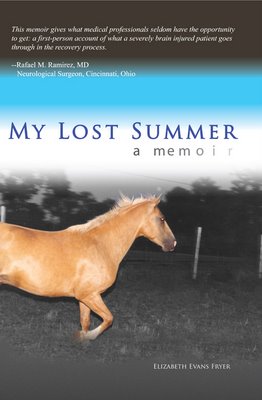Another Judge's Viewpoint

Several entries back I shared with you one judge’s opinion of my memoir, My Lost Summer. Yesterday I got in the mail the other judge’s thoughts on the book. They are a bit more positive.
On a scale of 1 to 5, with 1 meaning “poor” and 5 meaning “excellent,” please evaluate the following:
Structure and organization: 3
Grammar: 5
Cover design: 5
Judge’s commentary:
1. What did you like best about this book?
The cover is just gorgeous! Is that Flash? [Yes. Flash is the horse who tripped, dropping me, resulting in a coma.] The blues and golden brown of the scenes are calming and I really like the title too. The pace and detail fo Libbi’s time in the hospital work will – I feel I get a clear picture of what is going on. The journal entries from the mother [actually, my grandmother kept the journal] are also helpful by making the story more real and inclusive to the reader. Allowing the reader to enter inside the mental state of a patient recovering from a coma is a great feat. I even wish the author would have been less cautious with pointing out what were probably accurate perceptions/memories and not. I wouldn’t have minded a mixing of the two. (Perhaps show an outside perspective with the family journals?) [While I wrote this memoir, the whole fiasco was playing out of James Frey fabricating details in his memoir, A Million Little Pieces. I didn’t want to have to go through the same thing.] Chapters 10 on are just amazing. Seeing the frustrations and hearing the speech during recovery and in school was heart-breaking and triumphant. For me, this is where the story really began.
2. How can the author improve this book?
1. What happens in chapter one might be placed between chapter 2 and 3, where it occurs chromologically. And since chapter one is a part of the same event as two and three, you might just combine these three and call it chapter one. Larger and fewer chapters are helpful in that they eliminate some transitory signs that are not needed. 2. You might try playing around with the possibilities of chapter titles throughout. Don’t worry about being less direct about what the chapter contains in these titles. Your first sentences [of the chapters] do a really good job of grounding the reader. [3.] Chapter four is interesting since it touches on the few memories of innocence before the fall as well as the gaps in those memories. Since so much of Part I is in third person with chapter four being from Libbi’s viewpoint, this chapter might be expanded quite a bit for balance. This also might make the switch in tense more purposeful.
Read the other judge's review here.


0 Comments:
Post a Comment
<< Home